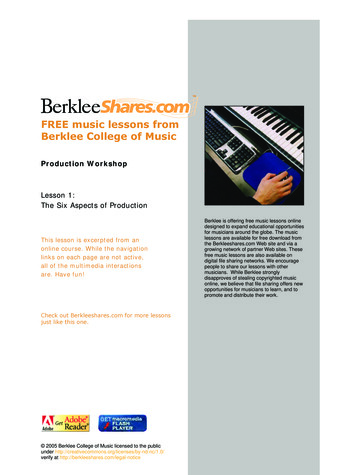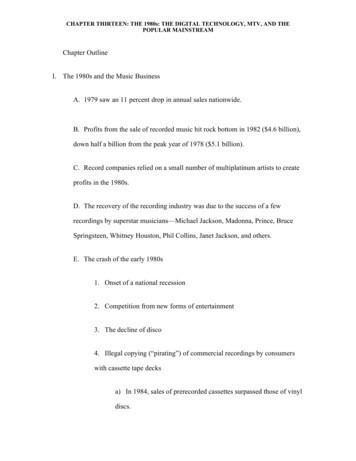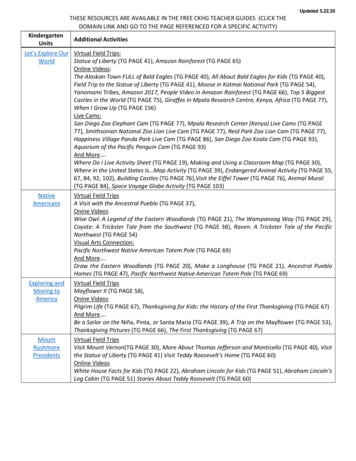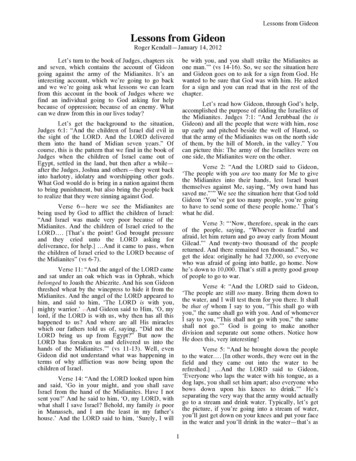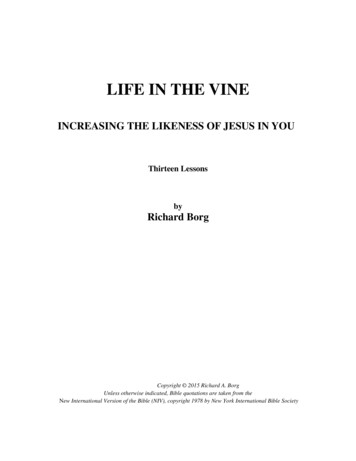
Transcription
LIFE IN THE VINEINCREASING THE LIKENESS OF JESUS IN YOUThirteen LessonsbyRichard BorgCopyright 2015 Richard A. BorgUnless otherwise indicated, Bible quotations are taken from theNew International Version of the Bible (NIV), copyright 1978 by New York International Bible Society
Life In The VineIncreasing the Likeness of Jesus in YouEvery day your character is tested by people and events. Life In The Vine will help you develop Christlike character and responses. Each sub-title below indicates the vital area of personal testing. Beginningwith John 13-17 in Lesson 1, Jesus makes an amazing promise to send the Holy Spirit to dwell in hisfollowers to grow the qualities of his character.ContentsBefore You BeginNotes to ParticipantsIntroductionOut of Your HeartLesson 1A Greater Righteousness - The Rebirth of a PhariseeLesson 2The Fruit of Holiness - Resisting My TemptationsLesson 3The Fruit of Love - Empowered to Forgive OthersLesson 4The Fruit of Humility - Surrendering My RightsLesson 5The Fruit of Joy - Deepening My Emotional StrengthLesson 6The Fruit of Peace - Calming My FearsLesson 7The Fruit of Patience - Improving My ”Waitability”Lesson 8The Fruit of Kindness - Taming My TongueLesson 9The Fruit of Goodness - Increasing My GenerosityLesson 10The Fruit of Faithfulness - Maintaining My HonestyLesson 11The Fruit of Gentleness - Expanding My InfluenceLesson 12The Fruit of Self-Control - Restraining My DesiresLesson 13The Fruit of Wisdom - Reaching My Greater PotentialFinal ThoughtsCopyright 2015 Richard A. BorgUnless otherwise indicated, Bible quotations are taken from theNew International Version of the Bible (NIV), copyright 1978 by New York International Bible Society.2
Before You BeginA Note to EveryoneEvery religion has its own set of rituals, values, morals and ethics. But these lessonson the fruit of the Spirit are much more than a mere study of ethics and virtues as somehave called them. Rather the fruit of the Spirit are the very qualities of Christ’s naturethat he desires to grow in you. What makes Biblical Christianity truly unique is thatfaith in Christ’s death and resurrection results in spiritual rebirth as described by Jesus inJohn’s gospel, chapter 3. Your faith in Christ grants forgiveness of sin and the certaintyof eternal life. But in this earthly life Christ lives in you by his Holy Spirit to transformyour character into his very likeness. You are reborn to be transformed!Life In The Vine invites you into that journey of spiritual growth.A Resource for PastorsLife In The Vine is a Biblical resource that challenges every Christ-follower to growin Christ-likeness through the Spirit-filled life. If you are looking for such a resource,consider the following suggested uses of Life In The Vine in your ministry:Supplement for preaching and teachingSpiritual development for all church leaders—pastoral staff, elders, deacons,teachers and small-group leadersSpiritual growth for participants in small groups and life-on-life discipleshipLife transformation in pre-marital and marriage counseling and enrichmentgroups.The selected scriptures in these lessons are based on two criteria. First, they are easilyunderstood literally without difficulty for the young or new follower of Jesus Christ.Insights into definitions or context or culture are provided when needed. Second, thelessons employ the simple rule that “scripture interprets scripture” to demonstrate theunity and cohesiveness of the Bible. These lessons are not exhaustive studies, but anintroduction to inductive study. All scriptures are from the New International Version.3
IntroductionOut of Your HeartEarly in the ministry of Jesus he said to “ a large crowd of his disciples ” (Luke6:17),No good tree bears bad fruit, nor does a bad tree bear good fruit.Each tree is recognized by its own fruit. People do not pick figsfrom thorn bushes, or grapes from briers. A good man brings goodthings out of the good stored up in his heart, and an evil manbrings evil things out of the evil stored up in his heart. Forthe mouth speaks what the heart is full of. Luke 6:43-45Life In The Vine will take you into a deeper understanding of the good fruit as well asthe evil fruit Jesus had in mind. But more important than mere understanding is the realgrowth of good fruit in your heart expressed in your everyday life in every relationship.The good fruit are the qualities of Christ’s character or likeness that He desires to growwithin you.On the other hand, the bad fruit within us is the result of our fallen nature and the evilinfluences that shaped our life. The list of influences is long: our DNA, family, culture,education and our many experiences, relationships and decisions. At first glance,changing our character appears impossible against this list of influences! Our only hopeis to be born all over again!Reborn To Be TransformedThe good news is that Jesus Christ came to give you a spiritual rebirth. Jesusexplained this to a high ranking Jewish leader named Nicodemus in John’s gospel chapterthree. While transformation of your character begins with a spiritual rebirth, it continuesprogressively through the work of the Holy Spirit in you. You were reborn to betransformed to resemble Him--in other words, to restore the image of God in you thatyour sinful nature has corrupted.How Long Does This Transformation Take?A good question. But here’s a good question for you: how long do you plan to be afollower of Jesus and when do you think your need to be like Him will end? The realityis, every morning of your life you awaken to new and real events that will challenge yourcharacter. Your journey through life will be “abundant”, in the words of Jesus (John10:10) if you follow Him and are led by His Spirit in you (Galatians 5:18). These are bigideas and experiences you will come to understand.Keep The Following In MindAs the knowledge of God in scripture is tightly woven, seamless and interdependent,so the fruits of the Spirit or the qualities of Christ’s character are likewise interdependent4
and function simultaneously. Therefore, it will be impossible to consider one fruitwithout thinking of the others. That’s OK! That is to be expected!Furthermore, most of the lists found in the Bible are not meant to be inclusive orcomplete. In Life In The Vine you’ll find three additional qualities of Christ’s characterthat are added to the Apostle Paul’s list in Galatians 5. Each lesson on every characterquality is structured around SOAP exercises: S.cripture, O.bservations, A.pplicationsand P.rayer.Also keep in mind, the Holy Spirit has many ministries in and through us such asprayer, salvation and spiritual gifts. But in these lessons we will look exclusively at theSpirit’s role in our character transformation into the likeness of Jesus Christ. Your desireto be like Christ will be rewarded as you remain in Him.One last thing--four hindrances could stand in your way that you must intentionallyovercome:1. Shifting blame to the bad fruit influencers in your life. You can’t use the excuse,“I’m a product of my environment and the people in it—I can’t change!” So ownyour flaws!2. Denial of your character flaws will block “confession”, meaning agreement withGod regarding your sin and sinful habits. Your pride stands in the way. Sohumble yourself!3. Facing character flaws may remind you of a painful past you don’t want to relive. Perhaps you’ll need to seek a good Christian counselor. So get help!4. Another hindrance may be your over-achieving work ethic to finish these lessonsquickly and prayerlessly. An authentic change in character is a marathon not asprint. So slow down!Let’s get started!Recommended Reading: The Introduction to The Grand Weaver: How God Shapes UsThrough the Events of Our Lives, by Ravi Zacharias.5
LIFE IN THE VINELesson 1A Greater RighteousnessThe Rebirth of a PhariseeAfter the Apostle Paul became a Christ-follower (Acts 9), he wrote this: “I know thatnothing good lives in my sinful nature. For I have the desire to do what is good, but Icannot carry it out” (Romans 7:18). Paul understood that Jesus had raised the standard ofmoral goodness. Jesus told his early followers, “ your righteousness [or moralgoodness and behavior] must exceed the righteousness of the Pharisees ” (Matthew5:20). Before Paul’s spiritual rebirth (John 3:3), he was a certifiable Pharisee. Hedescribed his former life to the Philippians, “ in regard to the law [I was] a Pharisee asfor legalistic righteousness [I was] faultless” (Philippians 3:3-6). So Paul rightlyunderstood his spiritual dilemma and ours as well— Christ expects us to live a life wecannot live by our own strength!While Paul had achieved a high level of legalistic righteousness, he could not live thelife Christ required of him by his own willpower or self-discipline. Jesus requiresrighteous behavior to come out of a righteous heart. Only a righteousness from withinproduces an authentic outward righteousness. By raising the standard, Jesus condemnsour hypocrisy and pride in legalistic righteousness or mere obedience to the laws of God.This new standard begs a number of good questions you might be asking:“So how do I avoid a Christian phariseeism of outward obedience in my ownstrength?“How do I overcome temptations and the sinful habits I can’t break?”“Why do I lack the joy of my salvation?”“How can I be more like Jesus and less like my old self?”If you are asking one or more of these questions you really need the answer to theultimate question: “How can I live the life Jesus requires me to live when he lifted thestandard of righteousness so high?” Who better to answer this question than Christhimself?Gathered in the upper room to observe the Passover, Jesus answers the ultimatequestion his confused disciples at this occasion were not even asking. Embedded inChrist’s teaching recorded in John chapters 13 to17, he reveals an amazing reality thesedisciples would eventually come to understand and enjoy after his death and resurrection.Simply stated that reality is this: Jesus must leave so his Spirit can personally live withineach of them and us as well. He taught them that his Spirit would empower them to liveCopyright 2015 Richard A. Borg6
the life he required of them. He repeated this reality over and over again and stated at theend of his prayer for all believers “ that I myself may be in them” (John 17:26). Thepersonal presence of Christ through the power of His Holy Spirit enables his followers tolive the greater righteousness He requires. How? The Spirit of Christ following ourspiritual rebirth grows in us the character of Christ-likeness. This is the focus of thesethirteen lessons on the fruit of the Spirit. In these lessons you will explore twelvequalities of Christ’s character His Spirit desires to form in you.Before you begin, read chapters 13-17 of John’s gospel in one reading—it will giveyou an overall understanding of the context and content of Christ’s teaching in the criticalmoments before his crucifixion and resurrection. This first lesson is foundational for yourunderstanding and experience of the Spirit of Christ in you. You can live the life Christhas called you to live! Welcome to Life In The Vine!PAUSE – Read John 13-17 in one reading.S.O.A.P. 1 - The Amazing PromiseThe disciples’ world is turned upside down in that upper room. Previously theywitnessed their teacher entering Jerusalem to the applause given to a king, but now theirking washes their feet! Then Jesus speaks of denial and betrayal by several of them.Then He tells them he is leaving but gives them an amazing promise. He promises tosend a Counselor—a title given to Jesus in the prophecy of Isaiah (9:6). He tells themthis Counselor is the Holy Spirit who will be in them to replace his physical presencewith them. His amazing promise is to every disciple including you!S.cripture – Before reading each scripture, read the question assigned to it below.John 7:37-39; 14:15-23; 15:26-16:16; Ephesians 2:18-22; 3:14-21O.bservations1. What do you envision when Jesus refers to the Holy Spirit (John 7) as“ streams of living water flowing from within [his followers]”?2. In John 14, 15 and 16 Jesus describes many ministries of the Holy Spirit—list asmany as you can find:7
3. In Paul’s inspired letter to the house churches in Ephesus he uses the metaphor ofa “house” to describe what relationships?A.pplications1. Based on Paul’s metaphor of the “dwelling place of God” what are some of yourfeelings about that?2. Jesus said, “ we will come to him [anyone] and make our home with him” (John14:23). What thoughts come to mind when you think of Jesus being “at home” inyou?3. What are two or three expectations you might have of the Holy Spirit as a“Counselor” in your life?1)2)3)4. Three times in Ephesians 3 Paul uses the word “power” by God’s Spirit tostrengthen us. In what two or three parts of your life do you feel you need moreinner strength?1.2.3.P.rayer - You have much to pray about. Open your heart to the Lord and tell him whatyou think or feel or desire from Him.S.O.A.P. 2 - Christ-like TransformationMost every child in elementary science learns the meaning of “metamorphosis” toexplain the amazing transformation of caterpillars into moths and butterflies. This Greekword is used by the Apostle Paul to explain the real transformation God intends foreveryone who experiences spiritual rebirth (John 3) through faith in Jesus Christ. Your8
rebirth is not the end but the beginning of an on-going transformation of your character.God intended that Christ-likeness should permeate your entire life for his glory. TheSpirit, whom Jesus sends, accomplishes this transformation when we choose to cooperatewith him in his work within us.S.cripture - Before reading each scripture, read the question assigned to it below.John 15:1-8; Romans 12:1-2; 8:29; II Corinthians 3:18; II Peter 1:3-11O.bservations1. Jesus uses the metaphor of “vine and branches” (John 15). He repeats “in me”and “in you” to describe his relationship with his disciples following hisresurrection. What is Jesus telling them, and us, by using this metaphor?2. How would you describe in your own words this transformation ormetamorphosis that Paul refers to in his letters to the Corinthians and Romans?3. What particulars come to mind when you read Paul’s words, “ the pattern of thisworld ” in Romans 12?4. What are the reasons Peter gives for “ participating in the divine nature ” (v.4)? In your own words list as many as you can from vs. 3-11.A.pplications1. According to Paul, why is this “transformation” so vitally important bothnegatively and positively?NegativelyPositively9
2. In what particular ways do you feel you are you still “conforming” to the patternof this world?3. If you are a “branch” living in the “vine” of Christ (John 15) and “participating inthe divine nature” (II Peter 1), how would you evaluate your progress in Christlikeness to date? On a scale of 1 to 10, evaluate your progress.Self-Likeness 1 2 3 4 5 6 7 8 9 10 Christ-LikenessP.rayer – Express your desire to the Lord to be transformed into the likeness of Christ.S.O.A.P. 3 - The Vinedresser’s TaskSince wine was the common beverage in Israel, the image of vines and branches andfruitfulness was easily understood. The vine is the single trunk of the plant from whichevery fruit-bearing branch is connected at the top. The vinedresser’s task is to cultivateeach branch to produce as much fruit as possible. For instance, one task of the vinedresser was to wash a branch that had fallen to the ground and was covered with dustand dirt. In the scriptures “fruit” is used to describe every good thing God wants to doin us and through us including the fruit of the Spirit which is the formation of Christ-likecharacter qualities.¹ Let’s begin to examine these qualities here.S.cripture - Before reading each scripture, read the question assigned to it below.Galatians 5:13-25; Ephesians 5:8-14; John 15:1-8, 17O.bservations1. If the Spirit of Christ dwells in us and the fruits of Christ-likeness increase(Galatians 5), do you think we lose our identity or personality in thistransformation? How would you describe what happens?2. How would you define “ the deeds of darkness ” (Ephesians 5) and why arethey “fruitless”?3. According to John 15, what does the “vinedresser” (the Father) do to cultivatemore fruit? What might this mean practically in someone’s life?10
A.pplications1. What qualities (fruit) in your character have you and/or others noticed growth inChrist-likeness?2. What did the vinedresser (the Father) do or allow to make this growth happen inyou?3. What qualities of character do you struggle with from the most to the least?Consider the 9 fruits in Galatians 5 and list them under the following threecategories:Struggle MostStruggle SomeStruggle LeastP.rayer – Tell the Father (the Vinedresser) you want to not only live in the Vine (Christ),but that you want Him to cultivate your branch to bear the fruit of Christ-Likeness.S.O.A.P. 4 - The Counselor Who SanctifiesJesus concludes the Passover meal in the upper room by praying aloud to the Father.He asks the Father to “sanctify” these men. The word “sanctify” means to be separatedfrom sin, that is, evil values or attitudes or speech, or desires or behaviors, and beseparated to the righteousness of Christ. Jesus described sanctification earlier as a workof the Holy Spirit (John 16:8-11). This is to be an on-going work of the Spirit in everyfollower of Christ including you! Inspired by the Spirit the Apostle Paul deepens ourunderstanding of sanctification in his letters to the house churches in the cities of Ephesusand Thessalonica. To the Ephesians, Paul writes in the Greek language, “ becontinually filled with the Spirit ” (Ephesians 5:18) who sanctifies us. Let’s begin tofind out how that happens!S.cripture - Before reading each scripture, read the question assigned to it below.Luke 4:1-15; John 17:13-19; 16:5-11; 14:15-17; I Thess. 5:19-24;Eph. 5:17-1811
O.bservations1. From Luke 4, write down the three phrases that describe the ministry of the HolySpirit to Jesus during his temptations:1.2.3.2. In your own words summarize how Jesus overcame the temptations.3. In his prayer Jesus asks the Father to “sanctify” the disciples (John 17). In John16:5-11 he states three general categories to describe the work of the Counselorwho accomplishes this sanctification. Find them and write them down here:1.2.3.4. In I Thessalonians 5, Paul uses the terms “fire” and “blameless” to describe thesanctifying work of the Holy Spirit. What could these terms mean in theexperience of becoming like Jesus? Your thoughts:“Fire”“Blameless”A.pplications1. Paul uses the metaphor of darkness to describe your “old self” before rebirth(John 3) and light to describe your “new self” after your rebirth. Write down asmany words or phrases as you can find that describe this “old self” and “new self”in Ephesians 4:17-5:18.Old SelfNew Self2. In Ephesians 4:30, Paul cautions us “ do not grieve the Holy Spirit ”, and in5:18 he exhorts “ be continually filled with the Spirit ” Do these statementsbeg the question, “How?” What do you feel or think? Explain here:How would you “grieve the Spirit”?12
How would you be “filled with the Spirit”?3. If you are to “ be continually filled with the Holy Spirit ” what does“continually” imply? Circle one:Once Few Annually Monthly Weekly Daily As Needed4. On a scale of 1 to 10, circle the number that best measures your eagerness to befilled with the Holy Spirit.Not Interested 1 2 3 4 5 6 7 8 9 10 Extremely EagerP.rayer - Ask Jesus to help you understand and desire the filling of his Holy Spirit in yourlife.Be sure to carefully read the following Further Thoughts, entitled, “How to be Filled withthe Holy Spirit”.Further Thoughts: How to be Filled with the Holy SpiritWe live in a self-help culture with self-help books and formulas for everythingimaginable. The internet provides steps for nearly every How-to-do-it project right at ourfinger tips. Instantly we can start, progress and finish. We marvel at the stories of peoplewho have overcome great odds by persistence, sacrifice, willpower and self-discipline.But in the Word of God we find no easy formulas for being filled with the Holy Spirit.No easy steps. Steps, in and of themselves, imply simplicity, self-determination andquick results. Formulas would imply that God can be coerced by our words and efforts—that God must dutifully act when we do the right things in the right order. But truthfully,we have nothing with which to leverage God’s servitude toward us. Nor can we define ordemand how God should help us. Why didn’t God give us a formula to be filled with HisSpirit? Because his glory and reputation will never depend on our achievements. God’sglory is his goal in transforming our character into the likeness of his Son and God willnot share or mix his glory with our pride (I Peter 5:5-6).So What Am I Supposed To Do?The most important insight into being filled with God’s Spirit, for his purpose totransform you into the likeness of Christ, is humble surrender. God makes theseprofound statements about Himself to Isaiah his prophet:For this is what the high and exalted One says --He who lives forever, whoseName is holy: ‘I live in a high and holy place, but also with the one who iscontrite and lowly in spirit, to revive the spirit of the lowly and to revive theheart of the contrite.’ Isaiah 57:15‘These are the ones I look on with favor: those who are humble and contritein spirit, and who tremble at my word.’ Isaiah 66:213
How will you know when you are humble enough? How do you measure your ownhumility? Fortunately, only God can measure your “lowly spirit”—your humblesurrender to the work and pleasure of His Spirit in you. God is anxious to fill you withHis Spirit in response to your humble desperation for Himself alone.Count Yourself DeadThe Apostle Paul wrote of this humble surrender as a kind of “death to self”experience. To the Romans he wrote this,In the same way, count yourselves dead to sin but alive to God in ChristJesus. Therefore do not let sin reign in your mortal body so that you obeyits evil desires. Romans 6:11For if you live according to the flesh, you will die; but if by the Spirit youput to death the misdeeds of the body, you will live. For those who are ledby the Spirit of God are the children of God. Romans 8:13-14In Paul’s letter to the Galatians he refers to the sinful nature six times in chapter 5 verses13-26 concluding with, “Those who belong to Christ Jesus have crucified the flesh withits passions and desires” (Galatians 5:24). This is not about co-mingling Christ’s naturewith your sinful nature but practically applying Christ’s crucifixion to your sinful nature.As you do that the nature of Jesus will emerge in you. It’s quite exciting!A Refreshing BreakthroughEvery follower of Christ must become aware of their need of Christ’s Spirit to sanctifythem (Romans 8). The first awareness will liberate you to grow toward Christlikeness andaway from the sinful desires and habits that imprison you in guilt and hopelessness. Youremotional response to your first “infilling” experience may be determined by how long orhow deep your struggle for self-righteousness has been.The greater yourimprisonment—the greater your joy! This is a welcomed blessing from the “ exceedingriches of [God’s] grace ” (Ephesians 2:7). While there is no pattern of emotionalresponse, this first experience of sanctification is a refreshing break-through for allfollowers of Christ. Sincerely make the filling of the Holy Spirit your on-going dailyrequest as you “humbly surrender” in your private conversations with God. Undoubtedlyyou will need and desire this grace for each new day!A Daily SurrenderTo be filled with the Spirit, who sanctifies or separates you from sinful desires andempowers you in the face of temptation and grows the fruit of Christ-likeness in you, isthe result of daily humble surrender in prayer. Jesus taught in the upper room, “ theFather will give you whatever you ask in my name ” (John 16:23-24), meaning, sincereprayer “for only those things that glorify Christ”. His likeness in you brings glory toChrist. “Living”, “walking” and “being led” by the Spirit (Galatians 5:16, 17 & 25)requires a way-of-life daily surrender. No formula here. Paul summed it up simply,“ be continually filled with the Holy Spirit ” While you live in God’s presence youmust actively choose to spend quality, uninterrupted time with God that is dedicated tointimate and deeply personal conversation with him. This conversation includes Hiswritten Word, His quiet voice that impresses and illuminates His Word for your heart andmind and your humble expressions of heart and mind back to the Lord. During this14
conversation re-surrender your heart again to Christ’s sovereign reign and the work of hisSpirit to conform you to his own likeness. Keep in mind this time with God is:Not a religious ritual with fixed forms and recitationsNot your achievement in Bible reading and prayer listsNot a discipline to endure.Every religion or cult requires activities like these, but only Christ offers you his Spirit—his personal presence in you.This conversation with God expresses a loving relationship. Just as you would not getup in the morning and ignore the spouse you love or remain silent and unaffected by thepresence of the children you love, your daily humble surrender to God will be yourdeepest joy and source of true life. This conversation is intended to be a desired practiceand pleasure.In addition, each day brings new challenges to your character and new temptations tosinful thoughts, attitudes and behaviors. Therefore, your need of God’s Spirit in your lifeis continuous. Living in the Vine and drawing life from the source of Christ’s life neverceases.Furthermore, Christ-likeness pleasantly impacts all of your relationships. If you are inthe midst of parenting, your need of Christ-likeness is multiplied. If you manage othersin the workplace your need for Christ-likeness is continuous. People who dislike you orannoy you for no other reason than their own dysfunction, make your need for the fruit ofChrist’s Spirit critical! Christ wants you to represent him to everyone you meet everyday.While you are positionally sanctified or separated from the condemnation of sin byChrist’s atoning death and resurrection, you are still in need of a daily progressivesanctification by Christ’s Spirit in you to live the righteous life of Christ’s likeness.Therefore, your progressive sanctification is not one prayer or filling for a lifetime, but alifetime of humble surrender and many fillings.Does Obedience Count?Unquestionably Christ commands your obedience. But it can’t be a bootstrapobedience in which you somehow, some way, find your own strength to obey by selfdetermination. In fact, that’s where the problem lies. What you stand in need of isDivine intervention by the Holy Spirit who empowers you to overcome your disobedientnature (Ephesians 3:14-21). By prayer humbly and actively choose to obey God’scommands and trust Him for the power of His Spirit. The Spirit delights to give you Hispower to obey authentically. In doing so God assures that His glory, not your willpower,is promoted. Remember, when God alone is glorified you will feel His pleasure.Footnote:¹Milne, Bruce, The Message of John. InterVarsity Press, Downer’s Grove, 1993,p. 222.Copyright 2015 Richard A. Borg15
LIFE IN THE VINELesson 2The Fruit of HolinessResisting My TemptationsWhat images come to mind when you hear the word “holy”?A joyless, expressionless face?Drab and colorless clothing?Regal robes and metal symbols?Socially secluded and disconnected?Because of their pious hypocrisy, Jesus called the “holy” Pharisees of the day,“painted graves”—they appeared clean on the outside while on the inside lay the stenchof death.If you are genuinely holy on the inside you wear a smile, common clothes and arequite sociable! So dismiss the misleading images and embrace the enriching nature ofholiness. The holy are liberated from self-destructive habits and the shame that createsdistance between themselves and God and others. To be holy is to be free from evils thatleave you lonely and full of self-loathing. God has called you to “ be holy, because Iam holy ” (I Peter 1:15-16)--holy on the inside so your mind, emotions, will andconscience are free from the destructions of sin.God’s HolinessGod’s holiness is simply defined as his moral purity and excellence--we might say histotal and absolute sinlessness. But his holiness goes immeasurably deeper. God did notattain his sinlessness by some moral standard outside of himself. Rather God was and isand will always be the standard of holiness. All holiness finds its origin in the eternalGodhead.The trilogy of words used in Hebrew Literature as in “Holy, holy, holy is the LordGod Almighty” (Isaiah 6:3) indicates that it is impossible for God to be any more holy ormorally pure than he is already. God’s holiness permeates every characteristic of hisDivine nature so He never acts or thinks or decides in any sinful way. Our understandingand language is inadequate to comprehend or communicate the enormous mystery ofGod’s holiness.Our SinfulnessThe evidence of our need for moral purity and ethical excellence is in us and allaround us. The New Testament is filled with lists of evil in its many forms. Christ wasCopyright 2015 Richard A. Borg16
sent to forgive us and restore the likeness of God’s holiness in us. In turn, Christ sent theHoly Spirit to fill you and make your holiness a growing reality. Your inner holinessdetermines what you are on the outside—a life free from accusation, a life of deep butmorally pure relationships. As you come to understand inner holiness in this lesson, itdoes not mean you will reach a state of perfect sinlessness unaffected by temptations.Rather, you
God regarding your sin and sinful habits. Your pride stands in the way. So humble yourself! 3. Facing character flaws may remind you of a painful past you don’t want to re-live. Perhaps you’ll need to seek a good Christian counselor. So get help! 4. Another hindrance may be your over-achi


